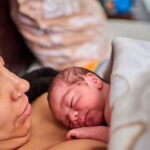Motherhood at any age
20s: The raring-to-go mom The mom in her 20s is […]

The mom in her 20s is the woman most likely to be found giving horsey rides and turning cartwheels to “show them how it’s done.” Her energy, flexibility and youthful outlook make her a fun hands-on mama.
Health
At 20-something, you’re quite possibly in prime condition to have a baby. Although there are many factors besides age that may cause complications, as a general rule, fertility and egg quality peak in a woman’s 20s. Biologically, she is now best prepared to carry and deliver a healthy baby, then bounce back to her normal self. The new mom in her 20s possesses greater skin elasticity (so long, saggy tummy!) and the energy needed to get herself back to the gym, even with less sleep than she’s used to.
Career
Here’s where it gets tricky. Starting a family and launching a career at the same time may be an overly ambitious undertaking (though certainly possible for the highly motivated). The good news is that staying home with baby for a bit at this age doesn’t have to rule out career options. If you choose to reenter the working world after a year or so at home, you’ll still be a marketable newcomer with youth on your side.
If baby arrives while you’re still in school, you’ll have a challenge ahead of you. Hitting the books and caring for a baby can be a lot to handle all at the same time. As a result, plenty of young moms delay attaining degrees or take their schoolwork at a slower pace, picking up fewer credits at a time and perhaps enrolling in online classes that fit better with the family’s schedule. It can be frustrating having to delay your own goals, but be patient with yourself—if you’re determined to make it work, you’ll get there!
Relationships
Tricia Goyer, author of Life Interrupted: The Scoop on Being a Young Mom and other titles, says that for her, the hardest part about being a young mother (three kids by age 22!) was making time for her marriage. “There were times when we had no money and we had to get creative about spending time together,” Goyer recalls. “We would get ice cream and a movie and have a date on the living room floor after we put our kids to bed.”
A 26-year-old mother of three boys, Ashley Stephens of Surprise, Arizona, also acknowledges that early parenthood can be rough on the romance: “Six years into marriage, [my husband] and I are finally starting to connect in ways we haven’t connected since before we saw that very first double blue line. We’ve learned the hard way how important it is to just take time for us.”
As parents, you and your significant other will see each other in new roles, and with positive communication, you can learn to lean on one another as you meet the demands of family life. Remember that maintain-ing a loving relationship will not only make your life sweeter, but will also benefit your child immensely.
Self
Plunging into parenthood early can take a leap of faith. You’re still learning about yourself, growing and shaping into the person you’ll be. Introducing a child at this time is exciting—you’ll get to grow up together, in a sense. A mother at 21, Stephanie Collette of San Antonio, Texas, says of her first pregnancy, “Neither of us knew what we were doing, but we knew our hearts were ready.”
Young motherhood can come with a dose of self-doubt, and that’s OK—of course you’re worried about being the best mom you can be. You’ll soon learn to trust your instincts and gain confidence in your ability to make decisions for your family. Goyer suggests, “When you’re so young, everyone will have advice for you. Listen to their advice, say thank you, and decide later if it’s something that works for you. You’re the mom—you know what’s best for your child.”
Illustrious ladies who were “Mom” by 20-something:
21 Charlotte Church
23 Reese Witherspoon
24 Kate Hudson
25 Demi Moore
25 Kate Beckinsale
27 Jessica Alba
27 Katie Holmes

Old enough to have some solid life experience behind her yet young enough to keep up with a toddler, the 30-something mom has a lot to offer. You might spy this mama socializing at the playground, watching over her little one, and checking work emails on her smartphone … all at the same time!
Health
The early 30s are a comparatively easy time to conceive, carry and deliver a healthy baby; physically, you’re poised and ready. After 35, however, things will begin to change, reproductively speaking —risks go up, conception rates go down. The closer you come to 40, the more difficult it will be to have a baby (and to recover after the fact too). Kathy Gunderson of Ashburn, Virginia, delivered her children at ages 35 and 39. She recalls, “I conceived [my first] very easily. In fact, I was a little shocked at how easy it was. Shortly after she was born, I realized that I wanted her to have a sibling. However, this time it wasn’t so easy to get pregnant. I began to wonder if I had waited too long and wouldn’t be able to have a second child. That, I think, is the biggest downside to waiting. Time is precious and limited.”
If you’re tempted to wait past your mid-30s before trying for a baby, consider the physical hardships that may lie ahead. You’ll most likely have greater success trying for a child sooner rather than later.
Career
It takes bravery to make time for a baby in your 30s. You may be at the peak of your career after spending your 20s with your nose to the grindstone, or you might be on your way there. In the workplace, you’re a valued commodity. Why risk losing that status? Because Mom is a line on your resume you’re not willing to forego.
Laura LaFors, mother of two in Denver, Colorado, voices concerns felt by many 30-something new mamas: “Even though you swear you will go back to work and be able to place your children in daycare, you find that you just can’t do it because it is so expensive and you don’t want someone else raising your children. I am worried about trying to get back into the corporate world. … By the time both kids are in school, I will be almost 40!”
Keeping up professional relationships will make the eventual return to work smoother. Tune in to developments in your field, and stay connected where you can with calls, emails and lunch dates. You’ll stress less about your comeback if you don’t feel that you’ve left the working world completely.
Relationships
This could be the easiest time to have a baby, relationship-wise. You may have been with your partner for a few years now, so you know each other well, you’ve had plenty of one-on-one time, and you’re ready to take the next step in building a family. If you’re both in your 30s, you still have the energy required to maintain a marriage, pursue individual goals, and care for a newborn too. Baby will enjoy coming into a solid, established home. She may also be able to benefit from an enriching bond with her grandparents, a relationship not always available if mom and dad wait longer to conceive.
Self
You may be feeling pretty confident about becoming a mom at this stage in your life. You’ve seen some of your friends welcome their own little ones, so imagining yourself as a parent doesn’t seem so far-fetched. Your friends and family form a capable support group, ready to cheer you on in your new position.
In your 30s, you know who you are and you know what you want. You’re prepared to take on motherhood.
Famous dames who became mamas in their 30s:
30 Natalie Portman
32 Cate Blanchett
34 Michelle Obama
36 Gwen Stefani
37 Amy Poehler
37 Julia Roberts
37 Sarah Jessica Parker
38 Madonna

There are more women over 40 joining the first-time mom club than ever before, a shift largely influenced by the success of modern fertility treatments. It’s not easy to come by a pregnancy after 40, so these are women driven by the desire to have a child, despite the physical and financial costs.
Health
Movie star moms can make it look easy to bear children later in life; however, according to top New York OB/GYN, fertility expert and high risk pregnancy specialist Amos Grunebaum, “Most famous people you hear about having twins when they’re around 45 or 46 use egg donors. Many people don’t realize it’s close to impossible to conceive naturally at this age.” Fertility markedly decreases every year past 35. In vitro fertilization (IVF) is pricey but promising when both egg and sperm are healthy samples.
When conception is achieved, the ensuing pregnancy is a minefield of possible complications. Past 40, chromosomal malformation is much more likely, increasing the odds of Down syndrome. A recent study also suggests that autism is close to twice as likely among moms over 40. Because of these risks, doctors typically offer genetic counseling to women over 35.
In addition, gestational diabetes, preeclampsia, placental abruption, placenta previa and premature delivery are more likely with older mothers. Throughout her pregnancy, the 40-plus mom will have more testing, ultrasounds and office visits than a woman in her 20s. Grunebaum counsels over-40 women to seek an OB with high risk experience even before attempting to conceive. A knowledgeable doctor will be able to diagnose preexisting health problems that could complicate the pregnancy, and then monitor closely throughout the gestational period so he doesn’t miss changes that could predict premature delivery.
Expect extra challenges in the delivery room as well. Dilation may be slower or inadequate, and multiple births are much more common, so C-sections are often necessary for older first-time moms. And once you’ve recovered from the C-section? Life with a newborn (or two) can be profoundly exhausting. P&N’s own Christine Jarrow mothered twin daughters at age 39. She admits, “I do think my body had a harder time physically bouncing back from the pregnancy,” and advises other later-life mothers to “get in the best physical shape you’ve ever been in so you can keep up with the little ones and enjoy every moment.”
Career
At 40-plus, you may be so established in your career that you can begin working from home or negotiate for more flexible hours in the office, allowing for more time with your little one. Or maybe not: You could be faced with the choice of either sacrificing your hard-earned career or having to hire a nanny to care for the baby you fought to bring into this world (and perhaps paid for with $50,000 in IVF treatments!). In weighing your options, remember that returning to work doesn’t make you a bad mom, and alternatively, stepping back from your career doesn’t lessen your value as a person. Be honest with yourself, and consider your long-term trajectory before deciding.
Relationships
Because a 40-something new mom is outside the statistical norm, it’s especially important for her to have a peer group to rely on. There are certain struggles that are unique to older mamas (i.e., being the most senior parent at preschool, having to correct strangers when they assume you’re the grandma, and most painfully, potentially facing the grief of incurable secondary infertility). Having comrades to commiserate with can be a powerful lifeline. If you can’t find an existing support group in your area, consider launching one or joining an online community.
Self
One could say that having a child very early shapes who you will become. In contrast, by age 40, you have had more time to get to know you; you can now apply yourself to motherhood with a mature perspective, perhaps with more self-awareness.
Nancy London, MSW, author of Hot Flashes Warm Bottles: First-Time Mothers Over Forty, says, “I don’t agree that older mothers are more peaceful, but simply having weathered a lot, we have a lot of wisdom.” She points out that younger parents are more apt to fall into the trap of imitating their own parents’ patterns, whereas older first-time parents may have a deeper understanding of who they are and what type of parents they want to be. “That is a big, shining plus: If you have done a lot of work on yourself, you have a lot to give as a person.”
Hollywood hotties who achieved motherhood after 40 candles:
40 Helen Hunt
41 Halle Berry
41 Mariah Carey
41 Salma Hayek
44 Marcia Cross
44 Susan Sarandon
46 Geena Davis







